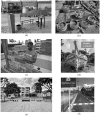A review of plastic waste circular actions in seven developing countries to achieve sustainable development goals
- PMID: 37519292
- PMCID: PMC11143764
- DOI: 10.1177/0734242X231188664
A review of plastic waste circular actions in seven developing countries to achieve sustainable development goals
Abstract
Plastic waste circularity is a priority at a global level. Sustainable development goals (SDGs) set the ways to go, and the circular economy principles underlined the 'green' strategies to be employed. However, in practice, there is still much to do, especially in developing countries, where open burning and open dumping still represent the common way of plastic waste disposal. This review aims to analyse current plastic waste circular approaches in low-middle income settings. Seven countries were selected based on the economic level and data availability from the authors, and analysed to collect and critically discuss the actions implemented at a city level. Examples of waste minimization and recycling strategies, selective collection systems and public campaigns are reported from Africa, Asia and Latin America. First, a background analysis related to physical and governance aspects of municipal solid waste management systems of the chosen settings was conducted. The assessment was focused on the treatment processes or minimization actions. Then, the applicability of the projects to achieve the SDGs was commented on. The outcomes of the research underline the need to: (1) scale up small-scale and pilot projects, (2) disseminate good practices in more low- to middle-income settings, (3) create synergies among international partners for further replications in cities. Urgent solutions to plastic waste pollution are needed. The review presented practical actions to be implemented now to boost plastic waste circularity in developing cities.
Keywords: Solid waste management; circular economy; informal recycling; sustainable development; waste pickers; waste valorization.
Conflict of interest statement
Declaration of conflicting interestsThe authors declared no potential conflicts of interest with respect to the research, authorship, and/or publication of this article.
Figures





References
-
- ADB (2013) Solid Waste Management in Nepal: Current Status and Policy Recommendations. Philippines: Asian Development Bank. Available at: http://hdl.handle.net/11540/817 (accessed October 2022).
-
- Agamuthu P, Mehran SB, Norkhairah A, et al.. (2019) Marine debris: A review of impacts and global initiatives. Waste Management & Research 37(10): 987–1002. - PubMed
-
- Anyango SO, Munyugi LK. (2018) E-waste management practices: Policies strategies and regulations, in selected national institutions, Nairobi, Kenya. Journal of Environmental Science, Toxicology and Food Technology 12: 81–92.
-
- Borrelle SB, Ringma J, Lavender Law K, et al.. (2020) Predicted growth in plastic waste exceeds efforts to mitigate plastic pollution. Science 369: 1515–1518. - PubMed
Publication types
MeSH terms
Substances
LinkOut - more resources
Full Text Sources

